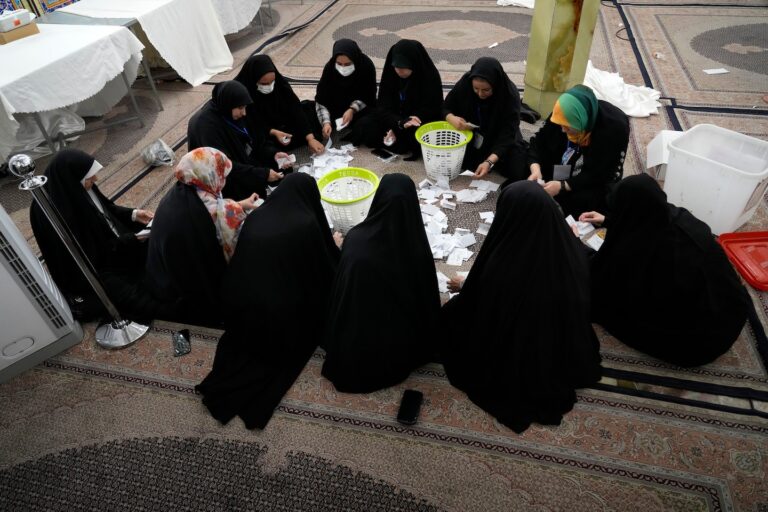If so, it would fit in with a positive trend in 2024, dubbed the “election year” due to the fact that countries representing half the world’s population will go to the polls. So far, the results show that democracy, while challenged, is far from defeated. Record numbers of people were able to vote. And various surveys show that democracy remains the overwhelmingly preferred form of government for the majority of people, including and especially in regions where democracy is lacking.
A Pew Research Center survey of 24 countries last year found that a majority support democracy, calling it a “good” or “very good” system. A majority oppose autocracies (71%) and military juntas (83%). In Africa, the world’s fastest-growing region and home to the youngest population, a 2021-2023 Afrobarometer survey found that two-thirds of people prefer democracy to any other form of government and blame leaders for failing to deliver it. Asian Barometer found similar sentiments among people in East Asia, including those living in one-party states.
To be sure, violence has marred many elections. Mexico recorded more than 300 violent incidents targeting candidates and their supporters. India saw a surge in ethnic violence, South Africa saw a spate of local-level assassinations, France saw candidates attacked while campaigning in parliamentary elections, and the United States saw an assassination attempt on former President Donald Trump.
Political violence is antithetical to the values upon which democracy is founded: open debate and the peaceful transfer of power. Authorities in every country have a responsibility to ensure that citizens can exercise their right to vote and candidates can campaign freely and without intimidation.
Many of the elections already held or scheduled for this year have not been free or fair; they have been democratic shams designed to allow autocrats to maintain power under a false pretense of popular support. Russia and Belarus spring immediately to mind. That said, hypocrisy is the tribute that vice pays to virtue, and the fact that autocracies feel compelled to hold sham elections is a clear, if indirect, indication that popular consent is the only internationally recognized source of political legitimacy.
Elections where incumbents did not manipulate the results or suppress the opposition produced some surprises. Voters held incumbents accountable for their actions. Given a choice, voters showed they wanted more freedom, not less. A good example is India, the world’s largest democracy. The country’s 640 million voters defied expectations that Prime Minister Narendra Modi would win by a landslide, stripping his Bharatiya Janata Party of an absolute majority in parliament. This was at least in part a response to Modi’s suppression of civil society and persecution of the country’s Muslim minority. In April, Turks strongly criticized President Recep Tayyip Erdogan in local elections. In Iran this summer, a tightly controlled presidential election posed no threat to the theocracies who actually rule. Voter turnout was at an all-time low. Still, those who voted expressed their dissatisfaction with the status quo as best they could. Candidate Masoud Pezechkian, who promised a more open internet and freedom of dress for women, defeated his ultra-conservative rival.
Africa has seen two major changes that could have ripple effects across the continent. In Senegal, President Macky Sall postponed voting to allow his chosen successor, Amadou Ba, to win the election. But voters instead chose opposition candidate Bashir Diomae Faye, who had only recently been released from prison, as the country’s new president, a victory for democracy in a region recently known for coups and military juntas. And in South Africa, voters fed up with endemic corruption, unemployment, crime, and a lack of reliable services like electricity and running water rejected the ruling African National Congress’ majority, forcing it to share power with other parties for the first time in the 30 years since the end of apartheid.
In Mexico and Indonesia, term-limited presidents were able to hand power to designated successors in elections that were generally considered free and fair. Though circumstances differed by region, both Indonesian President Joko Widodo and Mexican President Andrés Manuel López Obrador were popular because their supporters saw them as effective in delivering basic services and as agents of change who, rightly or wrongly, championed the poor over elites.
Taiwan’s Democratic Progressive Party retained the presidency with the election of Lai Ching-te. Taiwanese voters resisted the Chinese Communist Party’s massive campaign of intimidation and political disinformation, and should serve as an inspiration to other democracies threatened by such tactics.
Democracies around the world are under threat from the rise of illiberalism and authoritarianism. But halfway through this year, democracies have proven resilient. Democracy is not a perfect system, but millions of people around the world persistently and wisely choose it over other options.


